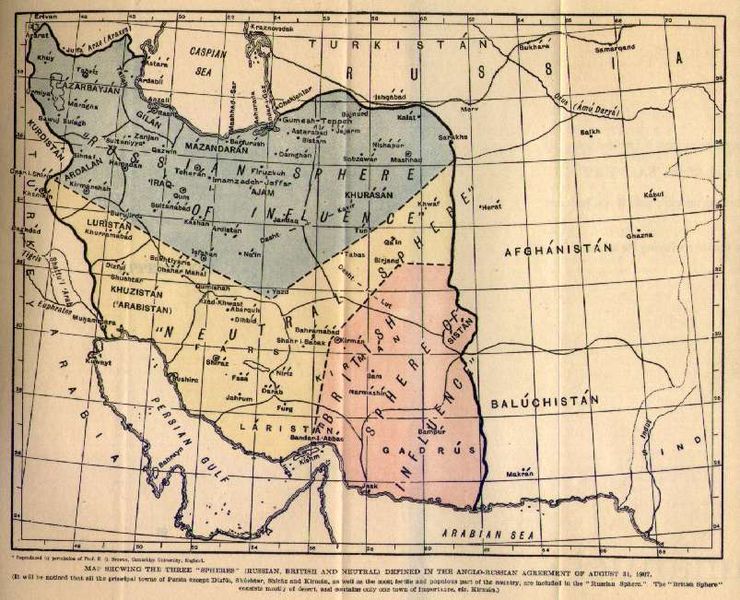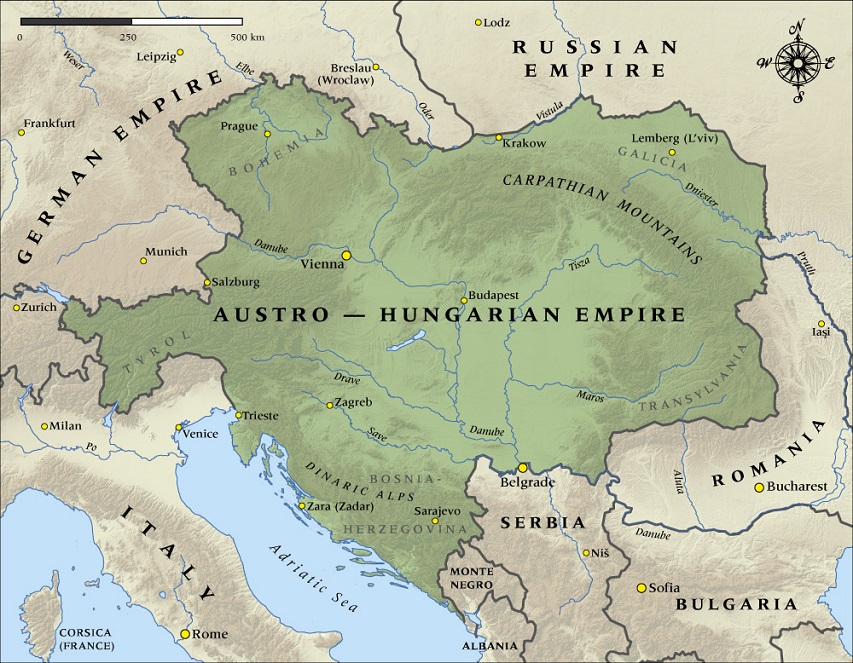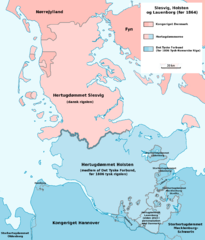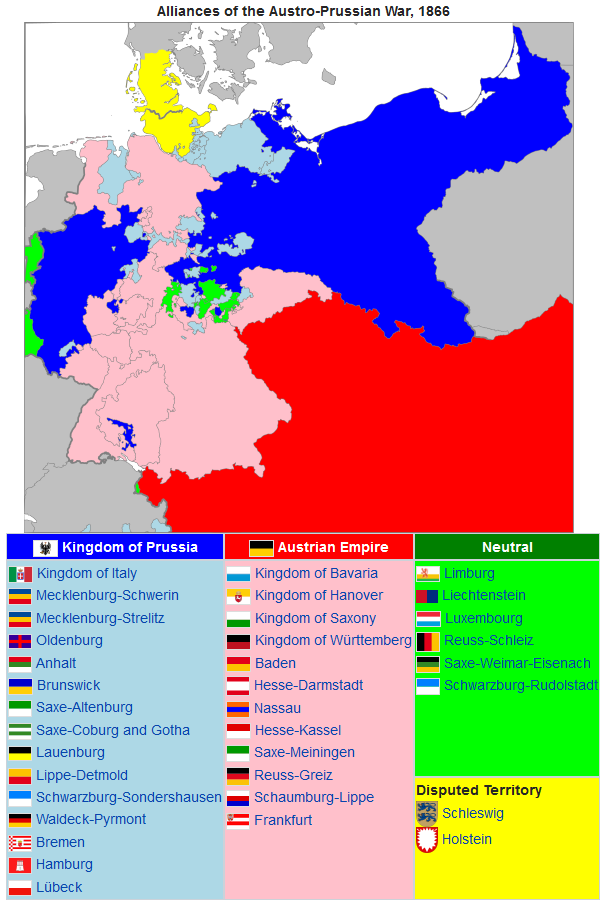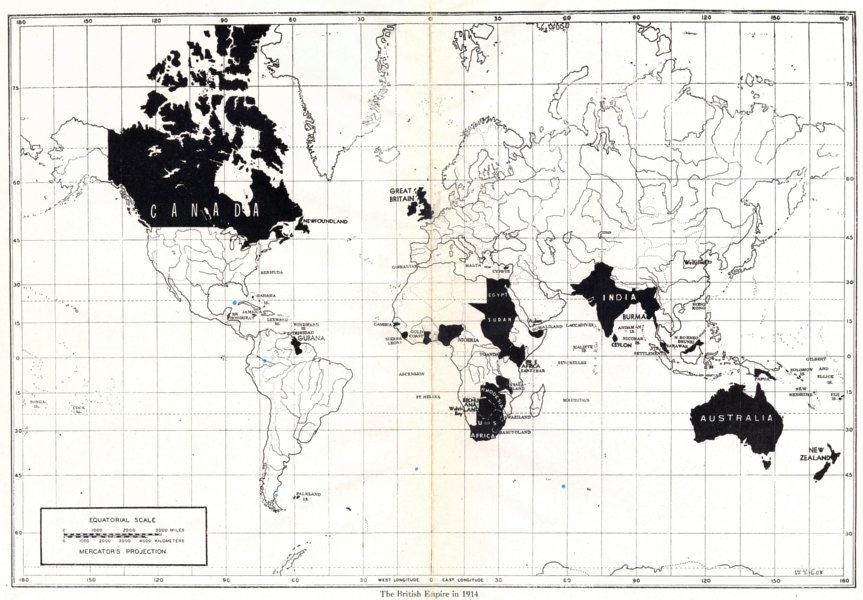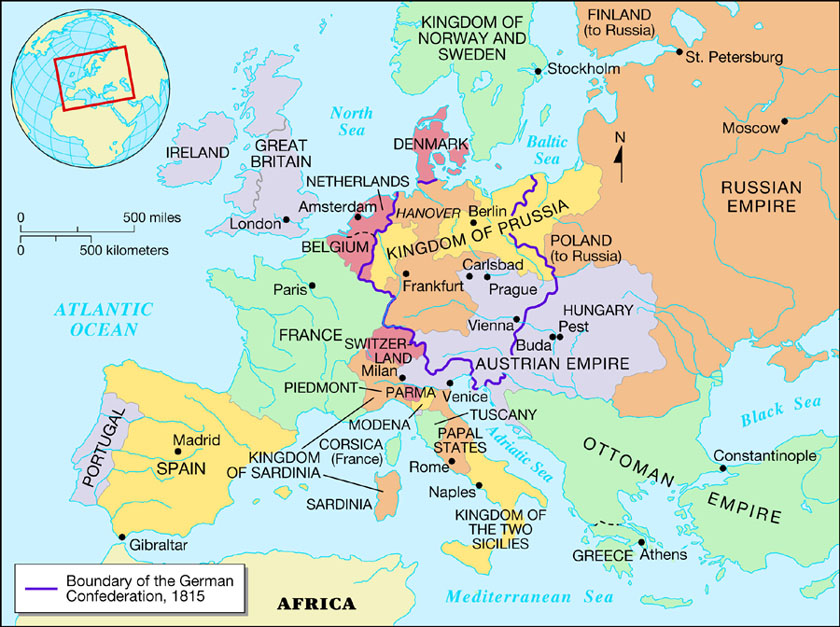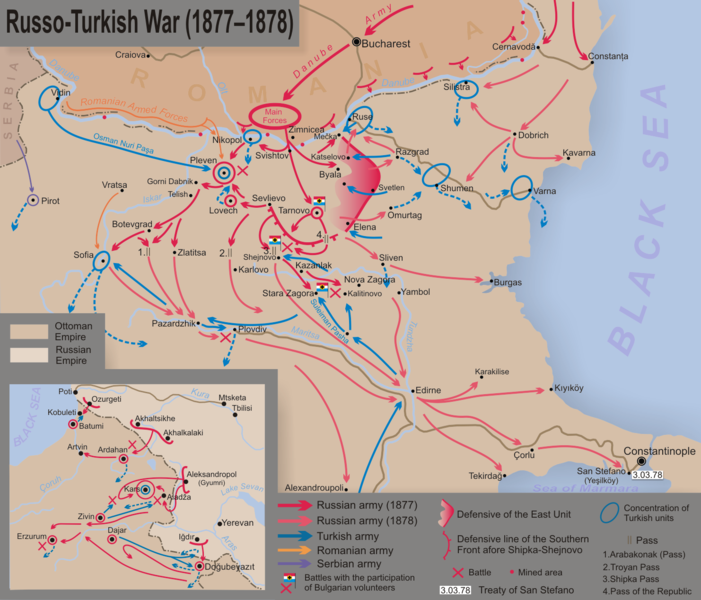Extra Credits
Published on 13 Oct 2017Otto von Bismarck became the greatest statesman of a generation, but he began as an intransigent and irresponsible youth. He coasted through college, got himself thrown out of an early political appointment, and caused havoc with his divisive opinions during a meeting of parliament.
October 16, 2017
Otto von Bismarck – I: The Wildman Bismarck – Extra History
December 9, 2014
Colby Cosh on the recent “unprecedented” terror attacks
In his latest Maclean’s article, Colby Cosh talks about the recent “freelance” terror attacks on Canadian soil and points out that no matter what the reporters say, they’re hardly “unprecedented”:
There has been much discussion about how to think of the type of freelance Islamist terrorist that has recently begun to belabour Canada. What labels and metaphors are appropriate for such an unprecedented phenomenon? I possess the secret: It is not unprecedented. This has been kept a secret only through some odd mischance, some failure of attention that is hard to explain.
I discovered the secret through reading about 19th-century history, particularly the years from the 1848 revolutions to the outbreak of the First World War in 1914. The key was Bismarck, the Prussian minister-president who unified Germany. If you want to learn about Bismarck, you will probably pick up a book by some historian of international relations, such as A.J.P. Taylor. That’s the right place to start. But it means you can read a lot about Bismarck before finding out about the time in May 1866 when a guy shot him.
Ferdinand Cohen-Blind, a Badenese student of pan-German sentiments, waylaid Bismarck with a pistol on the Unter den Linden. He fired five rounds. None missed. Three merely grazed his midsection, and two ricocheted off his ribs. He went home and ate a big lunch before letting himself be examined by a doctor.
[…]
The point is not that Bismarck was particularly hated, although he was. The point is that this period of European (and American) history was crawling with young, often solitary male terrorists, most of whom showed signs of mental disorder when caught and tried, and most of whom were attached to some prevailing utopian cause. They tended to be anarchists, nationalists or socialists, but the distinctions are not always clear, and were not thought particularly important. The 19th-century mind identified these young men as congenital conspirators. It emphasized what they had in common: social maladjustment, mania, an overwhelming sense of mission and, usually, a prior record of minor crimes.
In my Origins of WW1 series, I quoted from The War That Ended Peace (which I still heartily recommend):
Margaret MacMillan describes the typical members of the Young Bosnians, who were of a type that we probably recognize more readily now than at any time since 1914:
[They] were mostly young Serb and Croat peasant boys who had left the countryside to study and work in the towns and cities of the Dual Monarchy and Serbia. While they had put on suits in place of their traditional dress and condemned the conservatism of their elders, they nevertheless found much in the modern world bewildering and disturbing. It is hard not to compare them to the extreme groups among Islamic fundamentalists such as Al Qaeda a century later. Like those later fanatics, the Young Bosnians were usually fiercely puritanical, despising such things as alcohol and sexual intercourse. They hated Austria-Hungary in part because they blamed it for corrupting its South Slav subjects. Few of the Young Bosnians had regular jobs. Rather they depended on handouts from their families, with whom they had usually quarreled. They shared their few possessions, slept on each other’s floors, and spent hours over a single cup of coffee in cheap cafés arguing about life and politics. They were idealistic, and passionately committed to liberating Bosnia from foreign rule and to building a new and fairer world. Strongly influenced by the great Russian revolutionaries and anarchists, the Young Bosnians believed that they could only achieve their goals through violence and, if necessary, the sacrifice of their own lives.
The “peaceful century” from the defeat of Napoleon to the outbreak of the First World War was far from peaceful — we only see it as such in contrast to the bloodbath of 1914-1918. And terrorists of a type we readily recognize from the front pages of the newspapers today were prefigured exactly by the anarchist revolutionaries of a century ago.
August 14, 2014
Who is to blame for the outbreak of World War One? (Part ten of a series)
We’re edging ever close to the start of the Great War (no, I don’t know exactly how many more parts this will take … but we’re more than halfway there, I think). You can catch up on the earlier posts in this series here (now with hopefully helpful descriptions):
- Why it’s so difficult to answer the question “Who is to blame?”
- Looking back to 1814
- Bismarck, his life and works
- France isolated, Britain’s global responsibilities
- Austria, Austria-Hungary, and the Balkan quagmire
- The Anglo-German naval race, Jackie Fisher, and HMS Dreadnought
- War with Japan, revolution at home: Russia’s self-inflicted miseries
- The First Balkan War
- The Second Balkan War
The Balkans were the setting for two major wars among the regional powers (Serbia, Greece, Montenegro, Bulgaria, Rumania, and the Ottoman Empire), but the wars had not spread to the rest of the continent. This run of good luck was not going to last much longer. We turn our attention to Britain, France, and Russia … as unlikely a set of allies as you’d find in the 1880s, now in the process of discovering a common threat in Europe.
Sir Edward Grey and Britain’s progress from “splendid isolation” to official ambivalence
The British government had spent most of the previous century staying out of continental disputes, only rarely becoming politically or militarily involved. Late in the nineteenth century, this began to change, and Britain started paying closer attention to what was happening on the continent and moving slowly toward re-engagement. While the British and the French had spent more time as enemies or as mutually distrustful neutrals, France was now looking across the Channel for much more than mere neutrality.
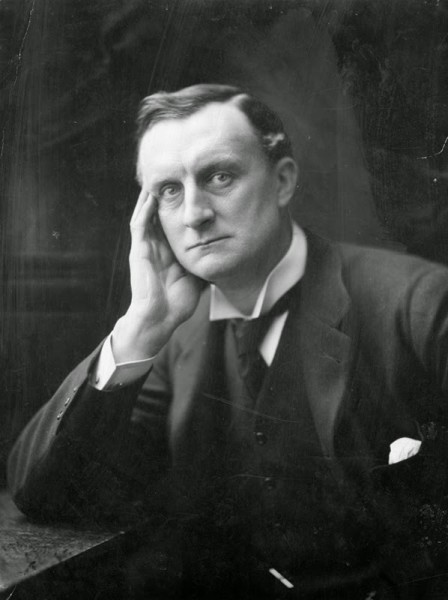
Sir Edward Grey, British Foreign Secretary 1905-1916
Sir Edward Grey had become foreign secretary on the formation of the Liberal government in December 1905, and remained in post until the end of 1916, so becoming the longest-serving holder of the post. Sir Edward brought diplomatic gravitas to his work in 1914. He had already convened the meeting of ambassadors that had contained and concluded the two Balkan wars of 1912-13. When the assassination of Archduke Franz Ferdinand at Sarajevo on June 28 prompted a third Balkan crisis, it seemed unlikely to have any direct effect on British interests, but Sir Edward might still prove central to its resolution. If the “concert of Europe”, the international order created in 1814-15 after the Napoleonic wars, still had life, the foreign secretary was the person best placed to animate it.
Sir Edward’s qualifications for such responsibility were of recent coinage. Notoriously idle as a young man, he had been sent down from Oxford, but returned to get a third in jurisprudence. He entered politics as much through Whig inheritance as ambition. He spoke no foreign language and, when foreign secretary, never travelled abroad – or at least not until he had to accompany King George V to Paris in April 1914. He seemed happier as a country gentleman, enjoying his enthusiasms of fishing and ornithology. His first wife increasingly refused to come to London, remaining at Fallodon, the family seat in Northumberland. Their life together was chaste and childless, but not unaffectionate.
Soon after becoming Foreign Secretary, Grey was careful to assure Russian ambassador Count Alexander Benckendorff that he wanted a closer and less fraught relationship with St. Petersburg. Britain’s long-running dispute with the expanding Russian Empire in Asia stood in the way of any co-operation between the two great powers: the “Great Game” across central Asia had been in progress for nearly a century and neither side trusted the other. British concerns that any advance of Russian interests across that vast swathe of land were part of long term plans to destabilize the Indian frontier and eventually to absorb India. Whether these fears were realistic is beside the point: they had driven Raj policy in India despite the low chance of them turning into actual dangers. The disagreements were partially settled with the Anglo-Russian Convention in 1907, where both Russian and British regional interests were codified:
Formally signed by Count Alexander Izvolsky, Foreign Minister of the Russian Empire, and Sir Arthur Nicolson, the British Ambassador to Russia, the British-Russian Convention of 1907 stipulated the following:
- That Persia would be split into three zones: A Russian zone in the north, a British zone in the southeast, and a neutral “buffer” zone in the remaining land.
- That Britain may not seek concessions “beyond a line starting from Qasr-e Shirin, passing through Isfahan, Yezd (Yazd), Kakhk, and ending at a point on the Persian frontier at the intersection of the Russian and Afghan frontiers.”
- That Russia must follow the reverse of guideline number two.
- That Afghanistan was a British protectorate and for Russia to cease any communication with the Emir.
A separate treaty was drawn up to resolve disputes regarding Tibet. However, these terms eventually proved problematic, as they “drew attention to a whole range of minor issues that remained unsolved”.
While the convention did not resolve every outstanding issue between the two imperial powers, it smoothed the path to further negotiations on European issues. One of the things the two had to consider was the expansion of German activity in Ottoman territory, especially the Baghdad Railway project, which threatened to extend German influence deep into the oil producing regions of Mesopotamia just as Britain was contemplating switching the Royal Navy from coal to oil. German engineers and financiers had already proven their worth to the Ottomans by building the Anatolian Railway in the 1890s, connecting Constantinople with Ankara and Konya.
Vernon Bogdanor’s recent History Today article explains Grey’s role in bringing Britain into the war alongside the French and Russians:
The growth of German power posed a challenge to an international system based on the Concert of Europe, developed at the Congress of Vienna following the defeat of Napoleon, whereby members could call a conference to resolve diplomatic issues, a system Britain, and particularly the Liberals in government in 1914, were committed to defend. Sir Edward Grey had been foreign secretary since 1905, a position he retained until 1916, the longest continuous tenure in modern times. He was a right-leaning Liberal who found himself subject to more criticism from his own backbenchers than from Conservative opponents. In his handling of foreign policy his critics alleged that Grey had abandoned the idea of the Concert of Europe and was worshipping what John Bright had called ‘the foul idol’ of the balance of power. They suggested that he was making Britain part of an alliance system, the Triple Entente, with France and Russia and that he was concealing his policies from Parliament, the public and even from Cabinet colleagues. By helping to divide Europe into two armed camps he was increasing the likelihood of war.
On his appointment in December 1905 Grey had indeed maintained the loose Anglo-French entente of 1904, which the Conservatives of the previous government had negotiated. He extended that policy by negotiating an entente with France’s ally, Russia, in 1907. In 1905 France was embroiled in a conflict with Germany over rival claims in Morocco. The French had essentially said to Lord Lansdowne, Grey’s Conservative predecessor: ‘Suppose this conflict leads to war – if you are to support us, let us consult together on naval matters to consider how your support can be made effective.’ The Conservatives had responded that, while they would discuss contingency plans, they could not make any commitments.
Grey continued the naval conversations and extended them to include military dialogue. He informed the prime minister, Sir Henry Campbell Bannerman, and two senior ministers of these talks, but not the rest of the Cabinet. Nevertheless, Britain could not be committed to military action without the approval of both Cabinet and Parliament. In November 1912, at the insistence of the Cabinet, there was an exchange of letters between Grey and the French ambassador, Paul Cambon, making it explicit that Britain was under no commitment, except to consult, were France to be threatened. In 1914, furthermore, the French never suggested that Britain was under any sort of obligation to support them, only that it would be the honourable course of action.
Romancing the bear, romancing the lion: France breaks out of imposed isolation
As I discussed back in part four of this series, the French had been left diplomatically isolated in Europe by German Chancellor Otto von Bismarck, but that began to change as Kaiser Wilhelm II took the throne and started imposing his will on German foreign policy. French money opened opportunities for French diplomacy, to the long-term benefit of French security. The Franco-Russian alliance was signed in 1894, signifying the end of French encirclement (Bismarck’s policy) and the start of German encirclement (Kaiser Wilhelm’s nightmare).

Britannia and Marianne dancing together on a 1904 French postcard: a celebration of the signing of the Entente Cordiale. (via Wikipedia)
French public opinion was still ambivalent at best about Britain — the PR and humanitarian disaster that was the Boer War had only just faded from the headlines, and there was still much resentment over the Fashoda incident — but the French government recognized the importance of gaining British support (and the British government was conscious of how low their international reputation had gone). Huw Strachan:
The previous Conservative government had in 1895 moved from “splendid isolation” to embrace the need to form alliances. But it was Sir Edward who narrowed these options by excluding the possibility of a deal with Germany. As a Liberal Imperialist, concerned by the evidence of British decline in the South African war, Sir Edward increasingly fixed Britain to France and then to Russia. The latter relationship may have looked frayed by 1914, but that with France was buttressed by military and naval talks. The result was not so much a balance of power in Europe as the isolation of Germany.
Moroccan crises and using the Kaiser as a bargaining chip
The First Moroccan Crisis of 1905-6 was a potential flashpoint between the Entente Cordiale and the German Empire. Germany was hoping to split the Entente or at least to gain territorial concessions in exchange for a resolution. Kaiser Wilhelm was on a cruise to the Mediterranean and had been intending to bypass Tangier, but the situation was manipulated by the Foreign Office in Berlin so that he eventually felt he had to put in an appearance. In The War That Ended Peace, Margaret MacMillan describes the scene:
Although Bülow had repeatedly advised him to stick to polite formalities, Wilhelm got carried away in the excitement of the moment. To Kaid Maclean, the former British soldier who was the sultan’s trusted advisor, he said, “I do not acknowledge any agreement that has been come to. I come here as one Sovereign [sic] paying a visit to another perfectly independent sovereign. You can tell [the] Sultan this.” Bülow had also advised his master not to say anything at all to the French representative in Tangier, but Wilhelm was unable to resist reiterating to the Frenchman that Morocco was an independent country and that, furthermore, he expected France to recognize Germany’s legitimate interests there. “When the Minister tried to argue with me,” the Kaiser told Bülow, “I said ‘Good Morning’ and left him standing.” Wilhelm did not stay for the lavish banquet which the Moroccans had prepared for him but before he set off on his return ride to the shore, he found time to advise the sultan’s uncle that Morocco should make sure that its reforms were in accordance with the Koran. (The Kaiser, ever since his trip to the Middle East in 1898, had seen himself as the protector of all Muslims.) The Hamburg sailed on to Gibraltar, where one of its escort ships accidentally managed to ram a British cruiser.
Tension rose so high that both Germany and France were looking to their mobilization timetables (France cancelled all military leave and Germany started moving reserve units to the frontier) before the diplomats were able to agree to meet at the conference table rather than the battlefield. The Algeciras Conference lasted from January to April, 1906, and the French generally had the better of the negotiations (with support from Britain, Russia, Italy, Spain, and the United States) while the Germans found themselves supported only by the Austro-Hungarian delegation. France ended up making a few token concessions, but overall retained their position in Morocco.
The Agadir Crisis of 1911 was the second incident in Morocco, where Germany tried a little bit of literal gunboat diplomacy with the gunboat SMS Panther. The port of Agadir was closed to foreign trade, but the Panther (and later the light cruiser SMS Berlin) was sent to “protect German nationals” in southern Morocco from rebel forces. A minor problem turned out to be that there were no conveniently threatened Germans in the region. Margaret MacMillan:
The Foreign Ministry only got round to getting support for its claim that German interests and German subjects were in danger in the south of Morocco a couple of weeks before the Panther arrived off Agadir, when it asked a dozen German firms to sign a petition (which most of them did not bother to read) requesting German intervention. When the German Chancellor, Bethmann, produced this story in the Reichstag he was met with laughter. Nor were there any German nationals in Agadir itself. The local representative of the Warburg interests who was some seventy miles to the north started southwards on the evening of July 1. After a hard journey by horse along a rocky track, he arrived at Agadir on July 4 and waved his arms to no effect from the beach to attract the attention of the Panther and the Berlin. The sole representative of the Germans under threat in southern Morocco was finally spotted and picked up the next day.
France reacted to the German provocation, despite efforts by Sir Edward Grey to restrain them: eventually he recognized that “what the French contemplate doing is not wise, but we cannot under our agreement interfere”. German public opinion, on the other hand, was ecstatic:
After its setbacks earlier on in Morocco and in the race for colonies in general, with the fears of encirclement in Europe by the Entente powers, Germany was showing that it mattered. “The German dreamer awakes after sleeping for twenty years like the sleeping beauty,” said one newspaper.
[…]
In Germany, public opinion, which had been largely indifferent to colonies ten years earlier, now was seized with their importance. The German government, which was already under considerable pressure from those German businesses with interests in Morocco, felt that it had much to gain by taking a firm stand. […] The temptation for Germany’s new Chancellor, Theobald von Bethmann-Holweg, and his colleagues to have a good international crisis to bring all Germans together in support of their government was considerable.
Eventually, after negotiations, France and Germany signed the Treaty of Fez, which granted France Germany’s recognition of her rights in Morocco in exchange for ceded French territory in French Equatorial Africa (which was annexed to the existing German colony in Togoland), including direct access to the Congo River. In addition, Spain was granted rights to a portion of northern Morocco which became Spanish Morocco.
Not part of the treaty terms, but of rather greater significance in the near future, France and Britain agreed to share responsibility for the naval defence of France: the Royal Navy took on the responsibility for defending the north coast of France, while the French navy redeployed almost all ships to the western Mediterranean with the explicit agreement to defend British interests in the region.
I’m finding each successive part of this blog series to be taking longer to put together, and not from a lack of material! I’m hoping to have the next installment posted sometime this weekend or early next week.
August 3, 2014
Who is to blame for the outbreak of World War One? (Part five of a series)
Over the last several days, I’ve posted entries on what I think are the deep origins of the First World War (part one, part two, part three, part four). Up to now, we’ve been looking at the longer-term trends and policy shifts among the European great powers. Now, we’ll take a look at the most multicultural and diverse polity of the early 20th century, the Dual Monarchy of Austria-Hungary.
Austria becomes Austria-Hungary
Here is a map of Austria-Hungary at the start of the First World War:
A big central European empire: the second biggest empire in Europe at the time (after Russia). But that map manages to conceal nearly as much as it reveals. Here is a slightly more informative map, showing a similar map of ethnic and linguistic groups within the same geographical boundaries:
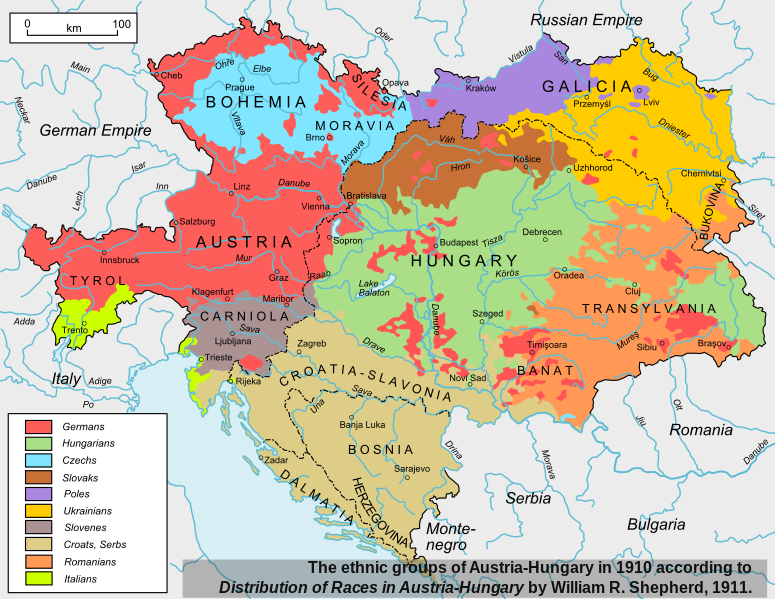
The ethnic groups of Austria-Hungary in 1910. Based on Distribution of Races in Austria-Hungary by William R. Shepherd, 1911. City names have been changed to those in use since 1945. (via Wikipedia)
This second map shows much more of the political reality of the empire — and these are merely the largest, most homogenous groupings — and why the Emperor was so sensitive to chauvinistic and nationalistic movements that appeared to threaten the stability of the realm. If anything, that map shows the southern regions of the empire — Croatia-Slavonia, Dalmatia, Bosnia, Herzegovina — to be more ethnically and linguistically compatible than almost any other region (which neatly illustrates some of the limitations of this form of analysis — layering on religious differences would make the map far more confusing, and yet in some ways more explanatory of what happened in 1914 … and, for that matter, from 1992 onwards).
Austria 1815-1866
For some reason, perhaps just common usage in history texts, I had the distinct notion that the Austrian Empire was a relatively continuous political and social structure from the Middle Ages onward. In reading a bit more on the nineteenth century, I find that the Austrian Empire was only “founded” in 1804 (according to Wikipedia, anyway). “Austria” as a concept certainly began far earlier than that! Austria was the general term for the personal holdings of the head of the Habsburgs. The title of Holy Roman Emperor had been synonymous with the Austrian head of state almost continuously since the fifteen century: that continuity was finally broken in 1806 when Emperor Francis II formally dissolved the Holy Roman Empire due to the terms of the Treaty of Pressburg, through which Napoleon stripped away many of the core holdings of the empire (including the Kingdom of Bavaria and the Kingdom of Württemberg) to create a new German proto-state called the Confederation of the Rhine.
The Confederation lasted until 1813, as Napoleon’s empire ebbed westward across the Rhine before the Prussian, Austrian, and Russian armies. After the Battle of Leipzig (also known as the Battle of Nations for the many different armies involved), several of the constituent parts of the Confederation defected to the allies. As part of the re-alignment of borders, treaties, and affiliations during the Congress of Vienna, both Prussia and Austria were added to the successor entity called the German Confederation, but Austria was the acknowledged leader of the organization.
The Rise of Prussia and the eclipse of Austria
The Kingdom of Prussia was the rising power within the German Confederation, and it was likely that at some point the Prussians would attempt to challenge Austria for the leadership of Germany. That situation arose (or, if you’re a fan of the “Bismarck had a master plan” theory, was engineered) over the dispute with Denmark over the duchies of Holstein and Schleswig.Denmark was not part of the confederation, but the two duchies were within it: the right of succession to the the two ducal titles were a point of conflict between the Kingdom of Denmark (whose monarch was also in his own person the duke of both Schleswig and Holstein) and the leading powers of the confederation, Austria and Prussia. When the King of Denmark died, by some legal views, the right of succession to each of the ducal seats was now open to dispute (because they were not formally part of Denmark, despite the King having held those titles personally).
In Denmark proper, the recently adopted constitution provided for a greater degree of democratic representation, but the political system in the two duchies was much more tailored to the interests and representation of the landowning classes (who were predominantly German-speaking) over the commoners (who were Danish-speakers). After the new Danish King signed legislation setting up a common parliament for Denmark and Schleswig, Prussia invaded as part of a confederate army, and the Danes wisely retreated north, abandoning the relatively indefensible southern portion of the debated duchies. In short, the campaign went poorly for the Danes, but quite well for the Prussians and (to a lesser degree) the Austrians. Under the terms of the resulting Treaty of Vienna, Denmark renounced all claims to the duchies of Schleswig, Holstein, and Lauenburg to the Austrians and Prussians.
Austria’s reward for the campaign was the duchy of Holstein, while Prussia got Schleswig and Lauenburg (in the form of King Wilhelm taking on the rulership of the latter duchy in his own person). The two great powers soon found themselves at odds over the administration of the duchies, and Austria appealed their side of the dispute to the Diet (parliament) of the Confederation. Prussia declared this to be a violation of the Gastein Convention, and launched an invasion of Holstein in co-operation with some of the other Confederation states.
This was the start of the Austro-Prussian War, also known as the Seven Weeks’ War. The start of the conflict triggered an existing treaty between Prussia and Italy, bringing the Italian forces in to menace Austria’s southwestern frontier (Italy was eager to take the Italian-speaking regions of the Austrian Empire into their kingdom. As the Wikipedia entry notes, the war was not unwelcome to the respective leaders of the warring powers: “In Prussia king William I was deadlocked with the liberal parliament in Berlin. In Italy, king Victor Emmanuel II, faced increasing demands for reform from the Left. In Austria, Emperor Franz Joseph saw the need to reduce growing ethnic strife, by uniting the several nationalities against a foreign enemy.”
In his essay “Bismarck and Europe” (collected in From Napoleon to the Second International), A.J.P. Taylor notes that the war took time and effort to bring to fruition, but not for reasons you might expect:
The war between Austria and Prussia had been on the horizon for sixteen years. Yet it had great difficulty in getting itself declared. Austria tried to provoke Bismarck by placing the question of the duchies before the Diet on 1 June. Bismarck retaliated by occupying Holstein. He hoped that the Austrian troops there would resist, but they got away before he could catch them. On 14 June the Austrian motion for federal mobilization against Prussia was carried in the Diet. Prussia declared the confederation at an end; and on 15 June invaded Saxony. On 21 June, when Prussian troops reached the Austrian frontier, the crown prince, who was in command, merely notified the nearest Austrian officer that “a state of war” existed. That was all. The Italians did a little better La Marmora sent a declaration of war to Albrecht, the Austrian commander-in-chief, before taking the offensive. Both Italy and Prussia were committed to programmes which could not be justified in international law, and were bound to appear as aggressors if they put their claims on paper. The would, in fact, have been hard put to it to start the war if Austria had not done the job for them.
Strategically, the Austro-Prussian war was the first European war to reflect some of the lessons of the recently concluded American Civil War: railway transportation of significant forces to the front, and the relative firepower differences between muzzle-loading weapons (Austria) and breech-loading rifles (Prussia). In the decisive Battle of Königgrätz (or Sadová), Prussian firepower and strategic movement were the key factors, allowing the numerically smaller force to triumph — Austrian casualties were more than three times greater than those of the Prussian army. This was the last major battle of the war, with an armistice followed by the Peace of Prague ending hostilities.
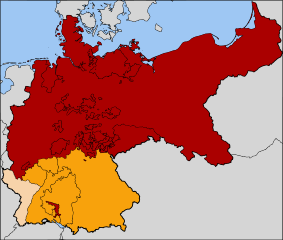 Initially, King Wilhelm had intended to utterly destroy Austrian power, possibly even to the extent of occupying significant portions of Austria, but Bismarck persuaded him that Prussia would be better served by offering a relatively lenient set of terms and working toward an alliance with the defeated Austrians than by the wholesale destruction of the balance of power. Austria lost the province of Venetia to Italy (although it was legally ceded to Napoleon III, who in turn ceded it to Italy). The German Confederation was replaced by a new North German Confederation led by Prussia’s King Wilhelm I as president, and Austria’s minor German allies were faced with a reparations bill to be paid to Prussia for their choice of allies in the war. (Liechtenstein at this time was separated from Austria and declared itself permanently neutral … I’d always wondered when that micro-state had popped into existence.)
Initially, King Wilhelm had intended to utterly destroy Austrian power, possibly even to the extent of occupying significant portions of Austria, but Bismarck persuaded him that Prussia would be better served by offering a relatively lenient set of terms and working toward an alliance with the defeated Austrians than by the wholesale destruction of the balance of power. Austria lost the province of Venetia to Italy (although it was legally ceded to Napoleon III, who in turn ceded it to Italy). The German Confederation was replaced by a new North German Confederation led by Prussia’s King Wilhelm I as president, and Austria’s minor German allies were faced with a reparations bill to be paid to Prussia for their choice of allies in the war. (Liechtenstein at this time was separated from Austria and declared itself permanently neutral … I’d always wondered when that micro-state had popped into existence.)
Aftermath and constitutional change
After a humiliating defeat by Prussia, the Austrian Emperor was faced with the need to rally the empire, and the Hungarian nationalists took this opportunity to again demand special rights and privileges within the empire. Hungary had always been, legally speaking, a separate kingdom within the empire that just happened to share a monarch with the rest of the empire. In 1867, this situation was recognized in the Compromise of 1867, after which the Austrian Empire was replaced by the Dual Monarchy of Austria-Hungary.
The necessity of satisfying Hungarian nationalist aspirations within the empire made Austria-Hungary appear as a political basket case to those more familiar with less ethnically, socially, and linguistically diverse polities than the Austrian Empire. From a more nationalistic viewpoint the political arrangements required to keep the empire together (mainly the issues in keeping Hungary happy) created a political system that appeared better suited to an asylum Christmas concert than a modern, functioning empire. In The Sleepwalkers, Christopher Clark explains the post-1867 government structure briefly:
Shaken by military defeat, the neo-absolutist Austrian Empire metamorphosed into the Austro-Hungarian Empire. Under the Compromise hammered out in 1867 power was shared out between the two dominant nationalities, the Germans in the west and the Hungarians in the east. What emerged was a unique polity, like an egg with two yolks, in which the Kingdom of Hungary and a territory centred on the Austrian lands and often called Cisleithania (meaning ‘the lands on this side of the River Leithe’) lived side by side within the translucent envelope of a Habsburg dual monarchy. Each of the two entities had its own parliament, but there was no common prime minister and no common cabinet. Only foreign affairs, defence and defence-related aspects of finance were handled by ‘joint ministers’ who were answerable directly to the Emperor. Matters of interest to the empire as a whole could not be discussed in common parliamentary session, because to do so would have implied that the Kingdom of Hungary was merely the subordinate part of some larger imperial entity. Instead, an exchange of views had to take place between the ‘delegations’, groups of thirty delegates from each parliament, who met alternately in Vienna and Budapest.
Along with the bifurcation between Cisleithania and Transleithania (Hungary), the two governments handled the demands of their respective majority and minority subjects quite differently: the Hungarian government actively suppressed minorities and attempted to impost Magyarization programs through the schools to stamp out as much as they could of other linguistic and ethnic communities. The Hungarian plurality (about 48 percent of the population) controlled 90 percent of the seats in parliament, and the franchise was limited to those with landholdings. The lot of minorities in Cisleithania was much easier, as the government eventually extended the franchise to almost all adult men by 1907, although this did not completely address the linguistic demands of various minority groups.
Hungary also actively prevented any kind of political move to create a Slavic entity within the empire (in effect, turning the Dual Monarchy into a Triple Monarchy), for fear that Hungarian power would be diluted and also for fear of encouraging demands among the other minority groups in the Hungarian kingdom.
Rumours of the death of Austria: mainly in hindsight, not prognostication
After World War One, many memoirs and histories made reference to the inevitability of Austrian decline. Most of these “memories” appear to have been constructed after the fact, rather than being accurate views of the reality before the war began. Christopher Clark notes:
Evalutating the condition and prospects of the Austro-Hungarian Empire on the eve of the First World War confronts us in an acute way with the problem of temporal perspective. The collapse of the empire amid war and defeat in 1918 impressed itself upon the retrospective view of the Habsburg lands, overshadowing the scene with auguries of imminent and ineluctable decline. The Czech national activist Edvard Beneš was a case in point. During the First World War, Beneš became the organizer of a secret Czech pro-independence movement; in 1918, he was one of the founding fathers of the new Czechoslovak nation-state. But in a study of the “Austrian Problem and the Czech Question” published in 1908, he had expressed confidence in the future of the Habsburg commonwealth. “People have spoken of the dissolution of Austria. I do not believe in it at all. The historic and economic ties which bind the Austrian nations to one another are too strong to let such a thing happen.”
Austria’s economy
Far from being an economic basket case, Austrian economic growth topped 4.8% per year before the start of WW1 (Christopher Clark):
The Habsburg lands passed during the last pre-war decade through a phase of strong economic growth with a corresponding rise in general prosperity — an important point of contrast with the contemporary Ottoman Empire, but also with another classic collapsing polity, the Soviet Union of the 1980s. Free markets and competition across the empire’s vast customs union stimulated technical progress and the introduction of new products. The sheer size and diversity of the double monarchy meant that new industrial plants benefited from sophisticated networks of cooperating industries underpinned by an effective transport infrastructure and a high-quality service and support sector. The salutary economic effects were particularly evident in the Kingdom of Hungary.
Okay, enough about Austria for now … remember I said that the causes of the war were complex and inter-related? By this point I hope you’ll agree that this case has been more than proven … and we’re still not into the 20th century yet!
August 1, 2014
Who is to blame for the outbreak of World War One? (Part four of a series)
Over the last few days, I’ve posted some entries on the deep origins of the First World War (part one, part two, part three). We’re still sorting out the end of Otto von Bismarck’s grand diplomatic juggling act, and we’ve barely dug into the fascinating ethnic, religious, cultural, and linguistic goulash of the Balkans.
France searches for allies
After the disaster of the Franco-Prussian War and the collapse of the Second Empire, France was left (for the second time) alone and friendless on the European stage. Having painfully rebuilt from the end of the Napoleonic wars, France faced the need to do it all again, but now with a newly unified and powerful enemy literally on the Eastern frontier.
The overriding foreign policy objectives of the Third Republic were finding ways to counteract the German Reich … even if it meant cosying up to the most autocratic regime in Europe. With Bismarck off the scene, the French were able to further pursue a dialogue with the Tsar’s government that actually began with financial aid from Paris in 1888 leading eventually to a formal alliance in 1892. The loans were intended to allow Russia to improve existing East-West railways and to build new ones with the purpose of allowing Russian troops to be more quickly concentrated on the German-Russian and (less urgently) Austrian-Russian borders. Russia had the military manpower while France had the financial means and technological know-how — both parties drew benefits from the deal (but the French needed the Russians more than vice-versa).
In The War That Ended Peace, Margaret MacMillan shows that the Russians were aware of the imbalance in the needs of the allies and resented the French attitude to them:
Although the French alliance had caused difficulties initially, Russian opinion had largely come around to seeing it as a good thing, a neat matching of Russian manpower with French money and technology. Of course, there were strains over the years. France tried to use its financial leverage over Russia to shape Russian military planning to meet French needs or to insist that Russia place its orders for new weapons with French firms. The Russians resented this “blackmail”, as they sometimes called it, which was demeaning to Russia as a great power. As Vladimir Kokovtsov, Russia’s Minister of Finance for much of the decade before 1914, complained: “Russia is not Turkey; our allies should not set us an ultimatum, we can get by without these direct demands.”
The French also put pressure on Russia to avoid confrontations with Britain, as French and British diplomats had started working toward some kind of understanding, and the French felt (with some justice) that the Russians might easily do damage to that process by some mild adventurism on a distant frontier with Britain’s colonies.
Britain’s global-scale worries
Britain’s lack of direct engagement during much of the period of the Concert of Europe was rational: British interests lay away from Europe, with the burgeoning colonies providing more than enough economic, diplomatic, and military activity for British tastes. From British Imperial viewpoints, the Germans were a mere distraction — it was the Russians who seemed to be threatening the Empire at every turn.
Margaret MacMillan writes that before the popular series of sensationalist novels by William Le Queux featured German invasions of Britain, his chosen villains were the Russians:
In Britain itself, public opinion was strongly anti-Russian. In popular literature, Russia was exotic and terrifying: the land of snow and golden domes, of wolves chasing sleighs through the dark forests, of Ivan the Terrible and Catherine the Great. Before he made Germany the enemy in his novels, the prolific William Le Queux used Russia. In his 1894 The Great War in England in 1897, Britain was invaded by a combined French and Russian force but the Russians were by far the more brutal. British homes were burned, innocent civilians shot and babies bayoneted. “The soldiers of the Tsar, savage and inhuman, showed no mercy to the weak and unprotected. They jeered and laughed at piteous appeal, and with fiendish brutality enjoyed the destruction which everywhere they wrought.”
Aside from the role of barbarous invaders in popular fiction, there were sufficient things to offend British consciences which added to this general dislike of the Russian state:
Radicals, liberals and socialists all had many reasons to hate the regime with its secret police, censorship, lack of basic human rights, its persecution of its opponents, its crushing of ethnic minorities and its appalling record of anti-Semitism. Imperialists on the other hand hated Russia because it was a rival to the British Empire. Britain could never come to an agreement with Russia in Asia, said Curzon, who had been Salisbury’s Under-secretary at the Foreign Office before he became Viceroy in India. Russia was bound to keep expanding as long as it could get away with it. In any case the “ingrained duplicity” of Russian diplomats made negotiations futile.
In the wake of the abortive 1905 revolution, it was easy to think of Russia as being weak and unstable, but as economic growth slowly returned, the government’s efforts to extend its control over far-flung recently acquired territories led to roads and railways being built … which Britain could hardly help but view as being at least partly military in nature:
It was one of the rare occasions on which [Curzon] agreed with the chief of the Indian general staff, Lord Kitchener, who was demanding more resources from London to deal with “the menacing advance of Russia towards our frontiers.” What particularly worried the British were the new Russian railways, either built or planned, which stretched down to the borders of Afghanistan and Persia and which now made it possible for the Russians to bring more force to bear. Although the term was not to be coined for another eighty years, the British were also becoming acutely aware of what Paul Kennedy called “imperial overstretch”. As the War Office said in 1907, the expanded Russian railway system would make the military burden of defending India and the empire so great that “short of recasting our whole military system, it will become a question of practical politics whether or not it is worth our while to retain India.”
More to follow over the next few days. This series of blog posts has certainly ballooned past what I originally thought would be required (and I’m skipping over masses and masses of stuff already). This just reinforces my earlier point that the situation was far more complex 100 years ago than we might think.
July 30, 2014
Who is to blame for the outbreak of World War One? (Part three of a series)
Over the last couple of days, I’ve posted some entries on the deep origins of the First World War (part one, part two). We’re just now getting to the point where the plots start twisting around one another like amorous snakes … this gets somewhat confusing from this point onwards (assuming you’re not already confused, that is).
Bismarck provides a masterclass in realpolitik
Otto von Bismarck looms large in the story of the origins of the First World War, although he died several years before it broke out: he was the pre-eminent architect of the German Reich, and a brilliant (and ruthless) diplomatic engineer. Despite a common belief that Bismarck as a warmonger, Eric Hobsbawm wrote that Bismarck “remained undisputed world champion at the game of multilateral diplomatic chess for almost twenty years after 1871, devot[ing] himself exclusively, and successfully, to maintaining peace between the powers” (The Age of Empire: 1875–1914).
While Bismarck became Chancellor of the new Reich in 1871, he had already held a series of important and powerful posts in the Prussian government, including Minister President of Prussia and Foreign Minister from 1861. In 1862, he made his long-range intentions quite plain in a speech to the Budget Committee:
Prussia must concentrate and maintain its power for the favorable moment which has already slipped by several times. Prussia’s boundaries according to the Vienna treaties are not favorable to a healthy state life. The great questions of the time will not be resolved by speeches and majority decisions — that was the great mistake of 1848 and 1849 — but by iron and blood.
In his long and impressive political career, he guided the creation of the unified German state while fending off the political demands of the liberals and socialists by conceding just enough to socialist pet causes to keep them working within the system (state pensions, for example, were a Bismarckian innovation calculated to just barely satisfy the left, but not to cost the state much if any actual revenue due to the high retirement age it set). He was emphatically not a fan of democracy: at one point, he finagled a “legal” way for the Prussian government’s revenues to continue for four years without a hint of democratic interference from the squabbling politicians in the Reichstag.
The editors of Bismarck’s Wikipedia entry seem to think he was first and foremost a benefactor to the working class, but I think they’re projecting — Reichskanzler Prince Otto von Bismarck was never particularly concerned with the welfare of the poor, except where that welfare contributed to the construction of a greater German empire. If that meant pandering to the Socialists, he’d pander with the best of them:
Bismarck implemented the world’s first welfare state in the 1880s. He worked closely with large industry and aimed to stimulate German economic growth by giving workers greater security. A secondary concern was trumping the Socialists, who had no welfare proposals of their own and opposed Bismarck’s. Bismarck especially listened to Hermann Wagener and Theodor Lohmann, advisers who persuaded him to give workers a corporate status in the legal and political structures of the new German state.
The wars he did fight were each calculated to advance the cause of German unification … under Prussian guidance and control, of course. Denmark lost the provinces of Schleswig (to Prussia) and Holstein (to Austria) in 1864, then Austria in turn lost Holstein (to Prussia) and Lombardy-Venetia (to Italy) two years later. His public moment of triumph was the proclamation of Wilhelm I as Emperor of Germany:
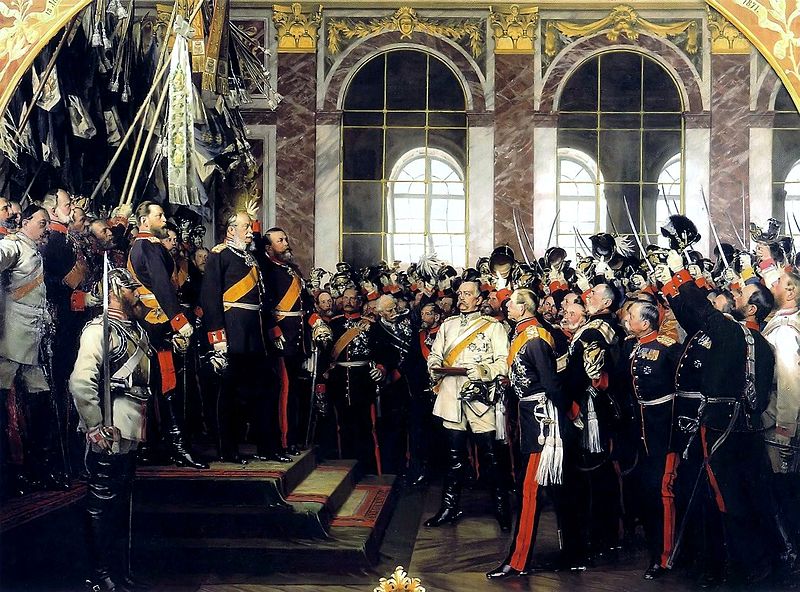
The proclamation of Prussian King Wilhelm I as German Emperor in the Hall of Mirrors in Versailles (Bismarck is at centre-right in the white uniform), by Anton von Werner. This version was commissioned by the Prussian royal family for chancellor Bismarck’s 70th birthday. (via Wikipedia)
Bismarck was not a fan of colonial adventures — he believed they were a distraction from more important issues in Europe and that the cost to obtain and run them was greater than the benefits derived from having them. Despite that, he allowed some colonies to be accumulated as game pieces to further his own priorities domestically. One of the European policies Bismarck implemented to great effect was the diplomatic isolation of France — on the quite reasonable basis that the French would take revenge on Germany for the humiliation of 1870 if they felt powerful enough to try it. The French Third Republic, which succeeded the Second Empire, was left without allies (and more galling: without the provinces of Alsace and Lorraine), due to Bismarck’s diligent efforts to bind the other great powers in alliances with one another and Bismarck managed to keep the French in that vulnerable position for the rest of his time in office.
Bismarck’s attempted solution to the Austro-Russian tensions in the Balkans was the Dreikaiserbund (The League of the Three Emperors) in 1873. This “meeting of the minds” was intended to dampen the risk of conflict by giving the Austrians a free hand in the Western area of the Balkans and the Russians a free hand in the East. The plan didn’t work as well as Bismarck had hoped, and the league was dissolved in 1887, as both of the other signatories felt too hampered by the terms of the agreement for too little benefit in return.
Bismarck’s next move was to create the Dual Alliance between Germany and Austria. The alliance was ostensibly defensive in nature, calling for each party to aid the other in the case of an attack by a third country (if the attacker was Russia, the alliance called for both parties to declare war, if it was another country — France — the non-attacked party was to remain neutral). In 1882, the Italians were added to the arrangement, but the terms of the Triple Alliance were not as defensive: requiring the other parties to actively assist an allied nation that was attacked, not just to remain neutral. Italy negotiated one clause in the agreement to ensure that they didn’t have to fight against Britain (which they activated in 1914).
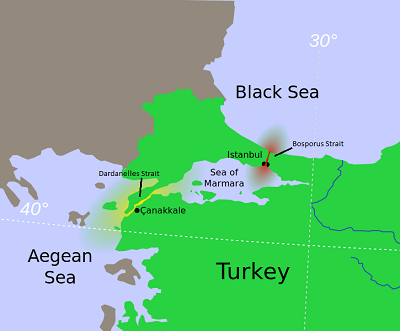
The Turkish Straits (Bosporus Strait highlighted in red, and the Dardanelles Strait in yellow) (via Wikipedia)
In a speech to the Reichstag in 1888, Bismarck predicted the bloody outcome if a localized Balkan War were to trigger a continental one (from Emil Ludwig’s 1927 work, Wilhelm Hohenzollern: The last of the Kaisers):
He warned of the imminent possibility that Germany will have to fight on two fronts; he spoke of the desire for peace; then he set forth the Balkan case for war and demonstrates its futility: “Bulgaria, that little country between the Danube and the Balkans, is far from being an object of adequate importance … for which to plunge Europe from Moscow to the Pyrenees, and from the North Sea to Palermo, into a war whose issue no man can foresee. At the end of the conflict we should scarcely know why we had fought.”
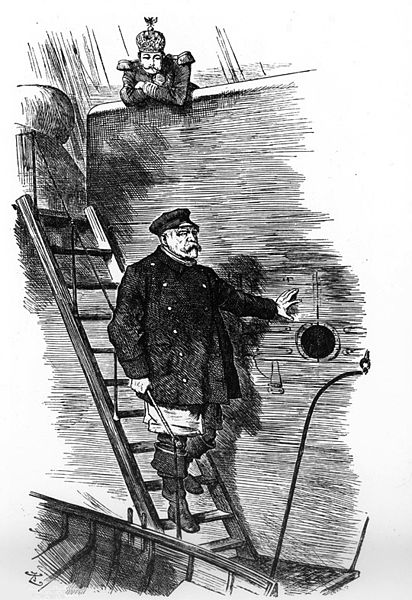
Dropping the Pilot, a caricature by Sir John Tenniel (1820-1914), first published in the British magazine Punch, March 1890. (via Wikipedia)
One of the first critical pieces of diplomatic plumbing to go was the Reinsurance Treaty with Russia: the Russian government asked to renew the agreement, but Chancellor Caprivi (Bismarck’s successor) and Kaiser Wilhelm II thought they could do better by working the personal relationship between Wilhelm and Tsar Alexander III (and later, his “dear cousin Nicky” — Tsar Nicholas II). This worked so well that the French and Russian governments were already extending tentative diplomatic feelers toward one another by 1891.
Willliam L. Langer wrote of the end of Bismarck’s career:
Whatever else may be said of the intricate alliance system evolved by the German Chancellor, it must be admitted that it worked and that it tided Europe over a period of several critical years without a rupture. … there was, as Bismarck himself said, a premium upon the maintenance of peace.
[…]
His had been a great career, beginning with three wars in eight years and ending with a period of 20 years during which he worked for the peace of Europe, despite countless opportunities to embark on further enterprises with more than even chance of success. … No other statesman of his standing had ever before shown the same great moderation and sound political sense of the possible and desirable. … Bismarck at least deserves full credit for having steered European politics through this dangerous transitional period without serious conflict between the great powers.”
The third post in the series and we still haven’t left the nineteenth century! More to follow in the next few days.
July 29, 2014
Who is to blame for the outbreak of World War One? (Part two of a series)
Yesterday, I posted the first part of this series. Today, I’m dragging you a lot further back in time than you probably expected, because it’s difficult to understand why Europe went to war in 1914 without knowing how and why the alliances were created. It’s not immediately clear why the two alliance blocks formed, as the interests of the various nations had converged and diverged several times over the preceding hundred years.
Let me take you back…
To start sorting out why the great powers of Europe went to war in what looks remarkably like a joint-suicide pact at the distance of a century, you need to go back another century in time. At the end of the Napoleonic wars, the great powers of Europe were Russia, Prussia, Austria, Britain, and (despite the outcome of Waterloo) France. Britain had come out of the war in by far the best economic shape, as the overseas empire was relatively untroubled by conflict with the other European powers (with one exception), and the Royal Navy was the largest and most powerful in the world. France was an economic and demographic disaster area, having lost so many young men to Napoleon’s recruiting sergeants and the bureaucratic demands of the state to subordinate so much of the economy to the support of the armies over more than two decades of war, recovery from war, and preparation for yet more war. In spite of that, France recovered quickly and soon was able to reclaim its “rightful” position as a great power.
Dateline: Vienna, 1814
The closest thing to a supranational organization two hundred years ago was the Concert of Europe (also known as the Congress System), which generally referred to the allied anti-Napoleonic powers. They met in Vienna in 1814 to settle issues arising from the end of Napoleon’s reign (interrupted briefly but dramatically when Napoleon escaped from exile and reclaimed his throne in 1815). It worked well enough, at least from the point of view of the conservative monarchies:
The age of the Concert is sometimes known as the Age of Metternich, due to the influence of the Austrian chancellor’s conservatism and the dominance of Austria within the German Confederation, or as the European Restoration, because of the reactionary efforts of the Congress of Vienna to restore Europe to its state before the French Revolution. It is known in German as the Pentarchie (pentarchy) and in Russian as the Vienna System (Венская система, Venskaya sistema).
The Concert was not a formal body in the sense of the League of Nations or the United Nations with permanent offices and staff, but it provided a framework within which the former anti-Bonapartist allies could work together and eventually included the restored French Bourbon monarchy (itself soon to be replaced by a different monarch, then a brief republic and then by Napoleon III’s Second Empire). Britain after 1818 became a peripheral player in the Concert, only becoming active when issues that directly touched British interests were being considered.
The Concert was weakened significantly by the 1848-49 revolutionary movements across Europe, and its usefulness faded as the interests of the great powers became more focused on national issues and less concerned with maintaining the long-standing balance of power.
The European Revolutions of 1848, known in some countries as the Spring of Nations, Springtime of the Peoples or the Year of Revolution, were a series of political upheavals throughout Europe in 1848. It remains the most widespread revolutionary wave in European history, but within a year, reactionary forces had regained control, and the revolutions collapsed.
[…]
The uprisings were led by shaky ad hoc coalitions of reformers, the middle classes and workers, which did not hold together for long. Tens of thousands of people were killed, and many more forced into exile. The only significant lasting reforms were the abolition of serfdom in Austria and Hungary, the end of absolute monarchy in Denmark, and the definitive end of the Capetian monarchy in France. The revolutions were most important in France, the Netherlands, Germany, Poland, Italy, and the Austrian Empire, but did not reach Russia, Sweden, Great Britain, and most of southern Europe (Spain, Serbia, Greece, Montenegro, Portugal, the Ottoman Empire).
The 1859 unification of Italy created new problems for Austria (not least the encouragement of agitation among ethnic and linguistic minorities within the empire), while the rise of Prussia usurped the traditional place of Austria as the pre-eminent Germanic power (the Austro-Prussian War). The 1870-1 Franco-Prussian War destroyed Napoleon III’s Second Empire and allowed the King of Prussia to become the Emperor (Kaiser) of a unified German state.
Russia’s search for a warm water port
Russia’s not-so-secret desire to capture or control Constantinople and the access from the Black Sea to the Mediterranean was one of the political and military constants of the nineteenth century. The Ottoman Empire was the “sick man of Europe”, and few expected it to last much longer (yet it took a world war to finally topple it). The other great powers, however, were not keen to see Russia expand beyond its already extensive borders, so the Ottomans were propped up where necessary. The unlikely pairing of British and French interests in this regard led to the 1853-6 Crimean War where the two former enemies allied with the Ottomans and the Kingdom of Sardinia to keep the Russians from expanding into Ottoman territory, and to de-militarize the Black Sea.
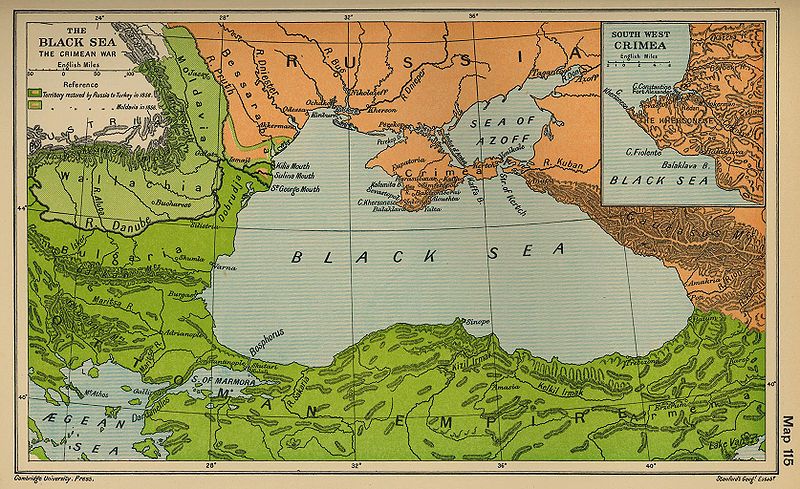
The Black Sea in 1856 with the territorial adjustments of the Congress of Paris marked (via Wikipedia)
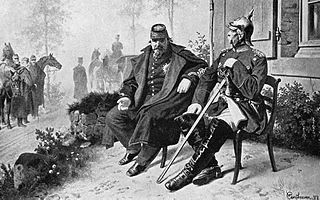
Prussian Chancellor Otto von Bismarck talks with the captive Napoleon III after the Battle of Sedan in 1870.
In the wake of Napoleon III’s fall, France declared that they were no longer willing to oppose the re-introduction of Russian forces on and around the Black Sea. Britain did not feel it could enforce the terms of the 1856 treaty unaided, so Russia happily embarked on building a new Black Sea fleet and reconstructing Sebastopol as a fortified fleet base.
Twenty years after the Crimean War, the Russians found more success against the Ottomans, driving them out of almost all of their remaining European holdings and establishing independent or quasi-independent states including Bulgaria, Serbia, Montenegro, and Romania, with at least some affiliation with the Russians. A British naval squadron was dispatched to ensure the Russians did not capture Constantinople, and the Russians accepted an Ottoman truce offer, followed eventually by the Treaty of San Stefano to end the war. The terms of the treaty were later reworked at the Congress of Berlin.
Other territorial changes resulting from the war was the restoration of the regions of Thrace and Macedonia to Ottoman control, the acquisition by Russia of new territories in the Caucasus and on the Romanian border, the Austro-Hungarian occupation of Bosnia, Herzegovina and the Sanjak of Novi Pazar (but not yet annexed to the empire), and British possession of Cyprus. The new states and provinces addressed a few of the ethnic, religious, and linguistic issues, but left many more either no better or worse than before:
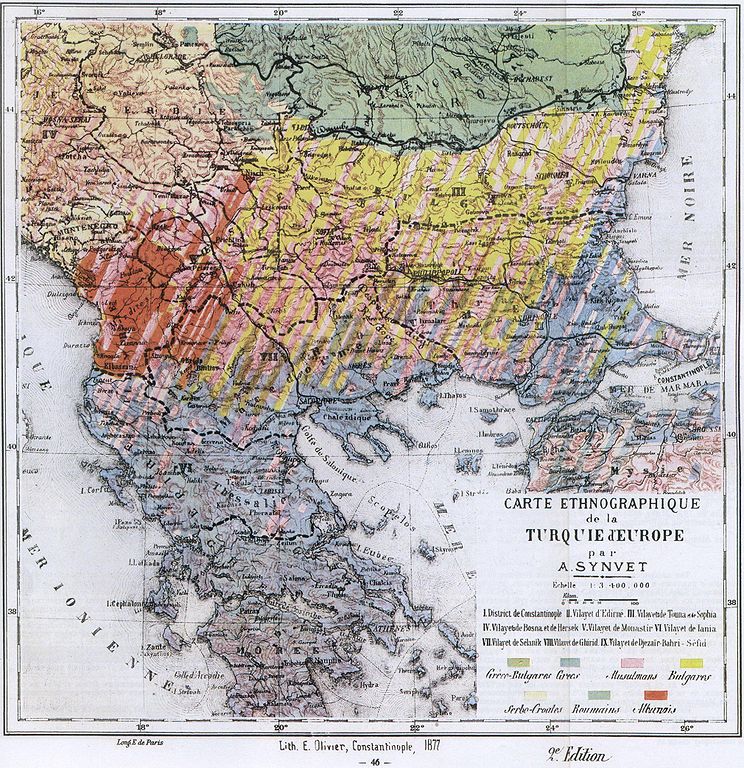
An ethnographic map of the Balkans published in Carte Ethnographique de la Turquie d’Europe par A. Synvet, Lith. E Olivier, Constantinople 1877. (via Wikipedia)
The end of the second post and we’re still in the 1870s … more to come over the next few days.

